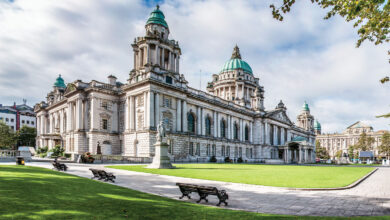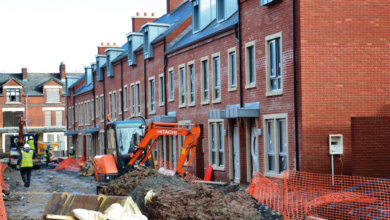Green New Deal
 Plans to revive Northern Ireland’s economy and improve energy efficiency have been published by a lobby group. agendaNi takes a look at the proposals which promise to slash fuel bills and carbon emmissions.
Plans to revive Northern Ireland’s economy and improve energy efficiency have been published by a lobby group. agendaNi takes a look at the proposals which promise to slash fuel bills and carbon emmissions.
A number of groups have come together to launch the Northern Ireland Green New Deal, which aims to tackle the recession, energy security and climate change.
The Housing Fund Business Plan, which was published in November, provides details of a £253 million investment scheme which would improve the energy efficiency of 100,000 homes over a three- year period. However, government support and funding are needed to make the scheme official.
Proposals suggest that a ‘one-stop-shop’ service could be made available for householders. They would be able to choose from a menu of energy saving measures, including improved heating controls, loft and cavity wall insulation, boiler replacement and solar hot water panels.
More than 2,300 jobs would be created, the group predict. They also state that 50,000 households currently in fuel poverty would benefit and it would result in more than 20 per cent reduction in average carbon emissions for homes.
The total cost of the investment would be £253 million and £72 million of this would be sought from government as grant support for householders. This leaves an investment of £181 million, including bank interest, which would have to be financed through borrowing from the European Investment Bank, commercial banks and household contributions.
Instead of paying for energy investments up-front, householders would have an option to pay-as-you-save. This would mean they could use the savings they make on their energy bills to repay a loan over a number of years.
Iain Osborne, who chairs the group, highlighted that household energy consumption accounts for more than a third of all the energy used in Northern Ireland.
He commented: “As a society, we must begin to reduce these levels and our reliance on fossil fuels, and the most cost- effective way of doing this is through our proposed housing fund.”
Osborne said he is “fully aware” of the funding constraints affecting government at present. However, he argued that politicians “must react and take leadership in order to help businesses recover from the recession” as well as enabling consumers “to reduce their energy bills and save money, while also reducing carbon emissions and energy usage.”
He argued that the investment that would be required from the Executive is reasonable: “We are seeking £6 million public money next year, rising to £43 million in the third year, £72 million in all. This is quite achievable given that government already spends £60 million per year on energy efficiency.” He added that it would be an “efficient” use of public money because it would pull in £123 million of private finance from bank loans paid off by householders.
Peter Bunting, the Assistant General Secretary of the Irish Congress of Trade Unions, said the proposals would be a welcome boost for the construction sector. He noted that, in the past year, output in the construction sector had declined by 15 per cent and said the plans would be “extremely socially useful” and would “deliver for the short-term needs of our economy and the long-term needs of our environment”.
The Northern Ireland Green New Deal Group is a coalition of 40 organisations and individuals from across the public, private and third sectors led by Bryson Group, the Confederation of British Industry, Energy Saving Trust, Friends of the Earth, Irish Congress of Trade Unions, the Institute of Directors, Nicva, the Northern Ireland Housing Executive, the Sustainable Development Commission, Utility Regulator and Ulster Farmers Union.
The plan is being supported by MLAs from all the main parties including the Alliance Party’s Stephen Farry, the SDLP’s Conall McDevitt, Sinn Féin’s Mitchel McLaughlin, Ulster Unionist Roy Beggs and the DUP’s Simon Hamilton.





